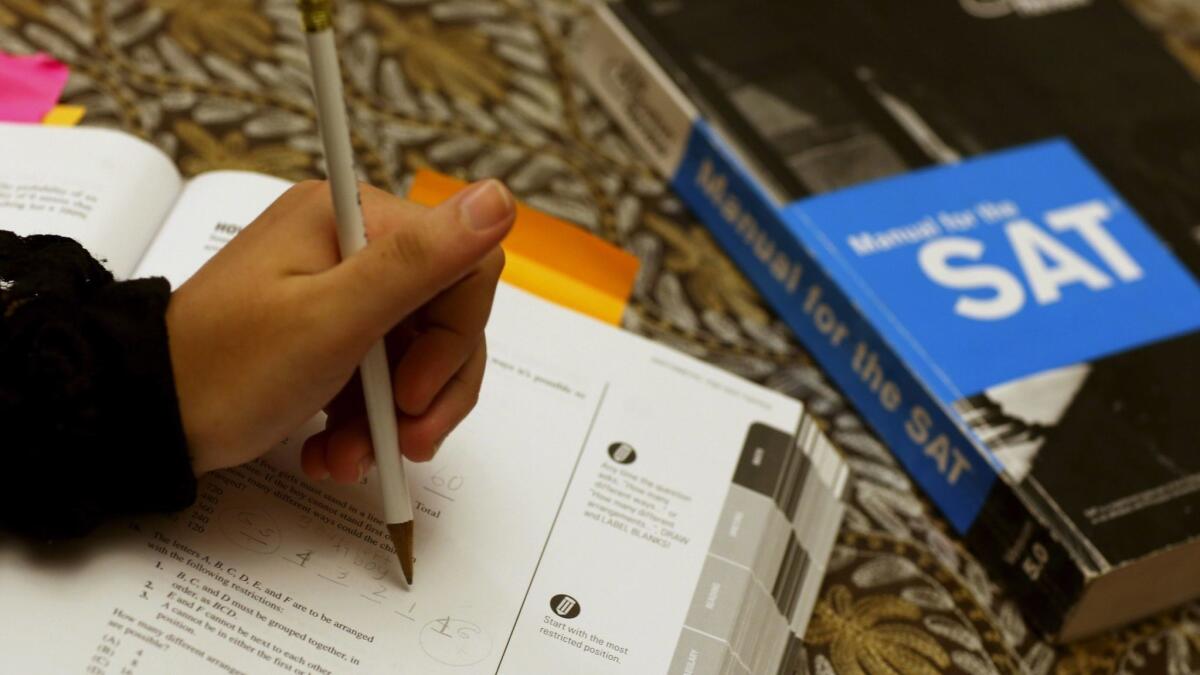Opinion: It’s time for UC to stop using the SAT

- Share via
Last week, a group of civil rights advocates and the Compton Unified School District threatened to sue the University of California if the system did not eliminate the SAT and ACT in admissions requirements. The groups charge that the tests discriminate against underrepresented minority students, as well as low-income and disabled applicants.
My son just took the PSAT along with more than 4 million other students this fall. I’ve been thinking a lot about standardized tests, especially since I am Asian American and Asian Americans as a group have the highest average SAT and ACT scores.
Many mistakenly believe that Asian Americans are naturally good at tests or work harder than everyone else. A better explanation is that Asian Americans, especially the groups that show the highest educational achievement in the U.S., Chinese and Indians, have benefited from what sociologists call hyperselectivity: immigration policies that recruit immigrants with higher levels of education than non-immigrants in their home countries and the rest of the U.S. population. Less than 10% of those in China have a college degree, but more than 50% of Chinese immigrants in the U.S. have a college degree. The same pattern goes for Indians.
Research by the College Board, the organization that offers the SAT, has found that parental education and family income correlate strongly with student performance on standardized tests.
And what does this test say about my son’s or any other student’s potential? It turns out, very little. Decades of research show that the SAT and ACT add little or nothing to the high school GPA’s prediction of a student’s performance in the first year of college.
Standardized admissions tests are weak predictors of student performance in the first year of college, and their predictive value drops further with each subsequent year of college. In fact, high school grades are better predictors of students’ long-term college success and become even more meaningful after the first year. This makes good sense — college admissions officers can learn more from four years of a student’s academic records than from a four-hour-long test taken on a Saturday.
Standardized admissions tests are also a waste of time and money. The SAT and ACT are good for the billion-dollar testing and preparation industry — but unduly burdensome for millions of families that can’t afford the cost of testing, retesting and test prep, which can cost thousands of dollars. In addition, these tests create unnecessary stress for young people already dealing with mental health challenges. Why pile on yet another onerous and time-consuming task for something that has been shown to be a better predictor of parent wealth and education than academic merit or long-term college success?
And why should my family or anyone else’s have to invest time and money in a tool that presents an unfair barrier to access to college for black, Latino and many Asian American groups? Research from California shows that Asian American groups such as Hmong and Filipinos tend to score lower on the SAT than other Asian Americans and other Californians. These patterns are reflected in college enrollment rates.
Members of some racial and ethnic groups, such as my own group, Chinese Americans, might complain that eliminating the test as a requirement will hurt their admission rates. But the University of California has eliminated standardized tests such as the SAT subject tests in the past and there is no evidence of a negative effect on Asian American admission rates.
When the University of Chicago eliminated the SAT as an admissions requirement, applications shot up, especially among first-generation college students, and at colleges such as Pitzer, which is test-optional, student performance is virtually identical between students who submit test scores and those who do not.
Dropping the SAT requirement will encourage colleges and universities to consider students like my son as a whole person with a range of experiences and accomplishments rather than reducing him to a test score. A test score cannot capture his love of new knowledge, passion for puzzles, quirky problem-solving skills or joy in contributing to a team. This change would be good for him, good for colleges and universities, and good for increasing educational access for all students.
Janelle Wong is a professor of American studies and a core faculty member in the Asian American Studies Program at the University of Maryland, College Park.
More to Read
A cure for the common opinion
Get thought-provoking perspectives with our weekly newsletter.
You may occasionally receive promotional content from the Los Angeles Times.










